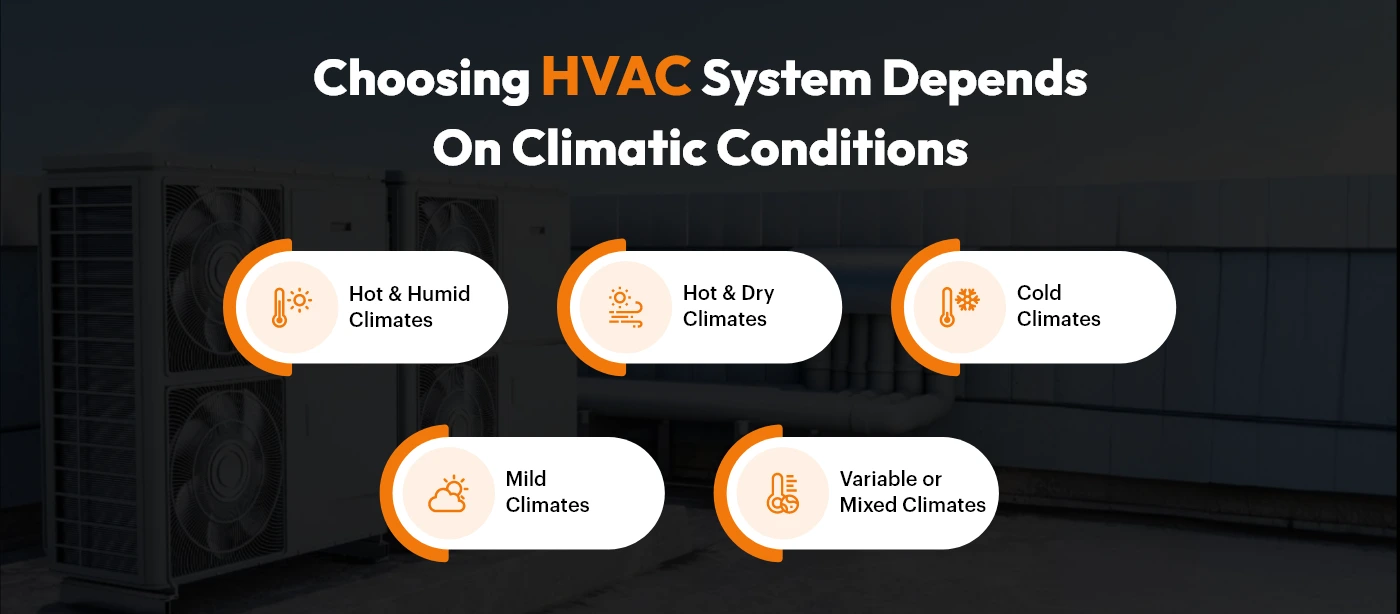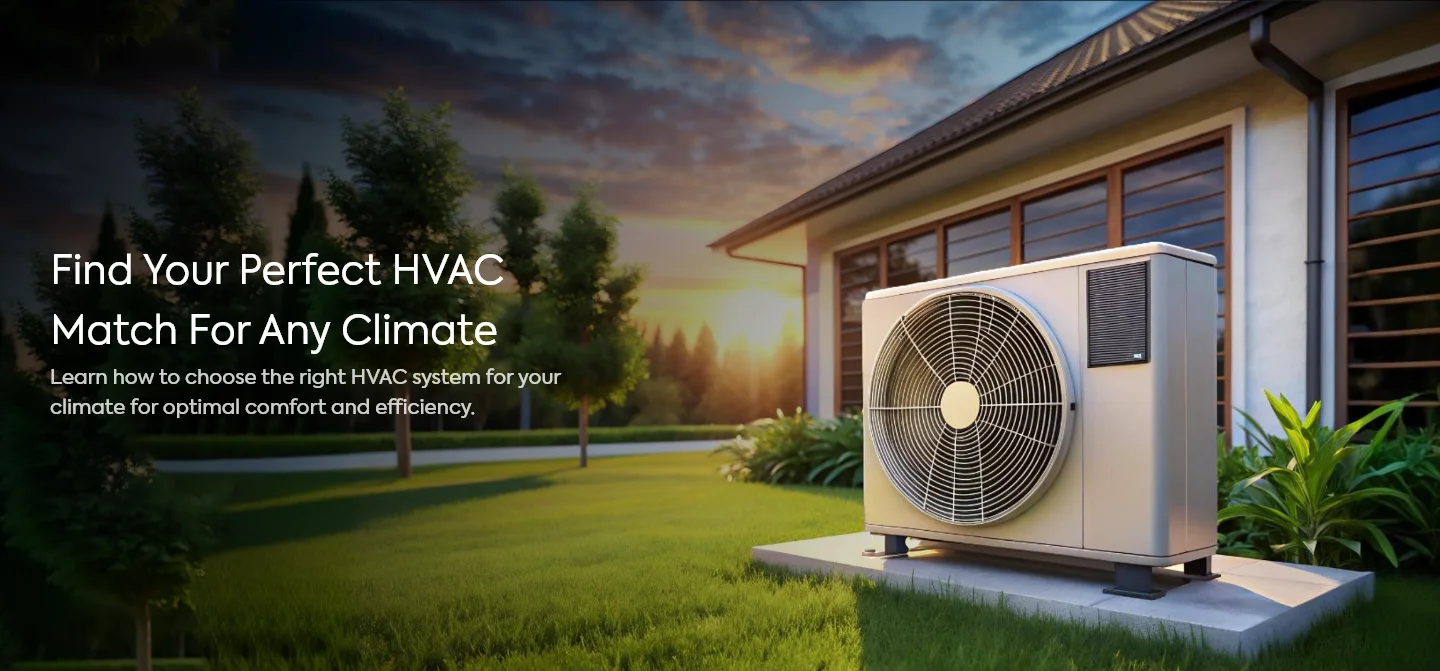Proper HVAC system choice depends on a deep understanding of your climate. These systems are tailored as per climatic conditions to provide great comfort and relaxation in all seasons i.e. freezing winters, sizzling summers, or normal weather conditions.
Generally, different regions have different climates! Below is the list that shows climate of US and Asia regions. Have a look-
Below is a list of climates in different regions.
- Cold (Northern US, Canada, parts of Europe)
- Mild (Coastal California, Mediterranean regions)
- Hot and Humid (Southeast US, parts of Asia)
- Hot and Dry (Southwestern US, Middle Eastern regions)
- Variable or Mixed (Midwest US)
Choosing the right HVAC system helps in maintaining comfort according to the varying local climatic conditions. Read the tips to choose the best HVAC system here in the blog.

1. HVAC Systems for Hot & Humid Climates
In hot and humid climates, your HVAC system can maintain fresh air quality and keep you calm all the time. They maintain high temperatures and humidity to avoid moisture buildup, which can later cause mold.
Variable speed compressors and smart thermostats are tech gadgets that help increase cooling and reduce humidity. Proper insulation, routine maintenance, and, energy-efficient distributors are also key to better productivity and reduced energy consumption under these harsh conditions.
2. HVAC Systems for Hot & Dry Climates
HVAC solutions for hot and dry climates emphasizes better cooling and energy savings. Evaporative hulls work well by using water to drive the hull downwind and decrease energy use. Embedded with features such as programmable thermostats and high-efficiency filters, these systems can enhance productivity and air quality.
Its good insulation and shading help keep out the heat. While, regular maintenance keeps the system running smoothly. Variable speed fans and energy-saving fans also improve comfort and efficiency. and guarantees a comfortable indoor space against the outside heat.
3. HVAC Systems for Cold Climates
When choosing an HVAC system for cold weather focus on energy efficiency. Thermal energy and convenience, high-efficiency furnaces, heat pumps, and furnaces provide consistent heat. Look for features like a variable speed motor and programmable thermostat for improved comfort and energy efficiency.
Good insulation and pouring help maintain heat inside. Regular maintenance keeps the system running and ensures the home stays warm and energy costs remain manageable.
4. HVAC Systems for Mild Climates
Humid climate HVAC devices focus on energy efficiency and cost savings while maintaining indoor comfort. Heat pumps are often used that provide both heating and cooling at different rates. This makes it suitable for locations with high temperature variations.
Smart thermostats and zone systems provide customizable control. While high-quality insulation and ventilation improve overall efficiency. Ensuring a quality of life all year round.
5. HVAC Systems for Variable or Mixed Climates
When building an HVAC system for mixed climates, controlling temperature and humidity at different levels is important. Technologies including variable refrigerant flow (VRF) and advanced devices including smart thermostats can save energy and maintain great comfort.
Multi-zone systems offer heating and cooling in different areas. Moreover, energy recovery ventilators (ERVs) enhance indoor air quality and reduce energy consumption. This makes these systems efficient and environmentally friendly.
Conclusion
Choosing the right HVAC system for your climate requires an understanding of local heating standards, your home’s heating and cooling needs, and energy efficiency assessment. Select the appropriate system to ensure comfort and save energy.
Whether it’s a hot summer or cold winter, our HVAC consulting experts at GGHS offer HVAC services in Anderson and can help you find the best technology for your needs.
The key factor to understand the right HVAC system is compressor technology. The compressor is essential in regulating temperature by circulating refrigerant, impacting energy efficiency and so, overall performance. Choosing a system with advanced compressor technology offers better climate control, less energy costs, and more comfort for your space.
When you are planning to install HVAC system in your home, you must evaluate right needs, research for options, give priority to energy efficiency, focus on budget constraints, and consult the licensed experts for tailored recommendations.
When choosing an HVAC system, the major three options include system type, energy source, and size or capacity. All these helps to choose the perfect HVAC system and maintain comfort in every season.
The best HVAC systems in humid areas are the ones that can handle moisture and also, provide sufficient cooling. You can use central AC systems, heating pumps, and dehumidifiers too.
Depending on the climatic conditions, home size and related preferences, HVAC system works best. The different types of HVAC systems include central AC, heat pumps, and ductless mini-split systems.
- Central AC are perfect for larger homes with ductwork.
- Heat Pumps can heat and cool moderate climates by transferring heat.
- Ductless Mini-Split Systems are ideal for ductless homes or specific zones.






